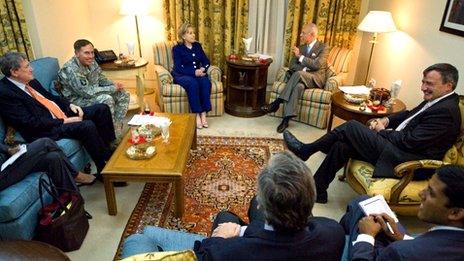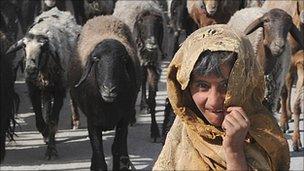Clinton defends US strategy in Afghanistan
- Published

The international community will want Afghans to commit to take over more of the job of reconstructing the country
War weariness is growing in the US.
Even allies of the Obama administration in Washington, like Senator John Kerry, are starting to ask if it is time to redefine the goals or whether it is a lost cause.
Polls show more than 50% of Americans want US troops to leave Afghanistan.
But ahead of an international conference in Kabul, Hillary Clinton vigorously defended the war effort and the US strategy, calling for strategic patience.
Mrs Clinton landed in Kabul on Monday amid heavy security and was met on the tarmac by the US ambassador to Afghanistan Karl Eikenberry and the new US commander of international troops, Gen David Petraeus.
They represent the two faces of America's strategy in Afghanistan, civilian and military.
Friction between the two sides had hampered the smooth conduct of the strategy under Gen Petraeus's predecessor, Gen Stanley McChrystal, who was fired last month.
Gamble
But what the US really wants is to see an increasingly Afghan face to the process and real Afghan ownership of the efforts to put the war-torn country on the road to recovery.
Hillary Clinton: "There's significant progress in Afghanistan, but it's not fast enough"
When the secretary of state had dinner with President Hamid Karzai, she told him she was "excited" about the conference, and he thanked her for her support and her hard work to make sure everybody attended the gathering.
Mrs Clinton has devoted a lot of her own time to - and perhaps even gambled some of her own reputation on - coaxing President Karzai on the road to governance, reform and development.
Whenever she meets him, in Kabul or Washington, she devotes considerable time to private, one-on-one meetings with the Afghan leader.
Within the Obama administration, she seems to speak the most forcefully and perhaps most convincingly about the strategy being pursued in Afghanistan.
Before Kabul, Mrs Clinton visited Islamabad where, in a BBC interview, she warned that "we know what happens when we abruptly and prematurely leave Afghanistan", adding that it was "a fight worth waging".
'No alternative'
She admitted that the Obama administration was playing "catch up" and blamed the eight years of the Bush administration for the deteriorating situation President Barack Obama inherited in Afghanistan.
But she insisted that the strategy was the right one, saying: "I don't see an alternative. I think we are on the right track and I think we have to persevere and I think we can do that."
Few Western officials still speak with such conviction about the possibility that success is still attainable.
Pessimism has mostly taken over and Afghanistan is described by some as being in a state of free fall, with the Taliban biding their time until US and ISAF troops start leaving.
Mrs Clinton did acknowledge the strategy was not easy one and said the conference was a good opportunity to take stock and get reports from all those involved on the progress made.
The Afghans are expected to ask for greater control over foreign aid for reconstruction.
Mrs Clinton admitted that international aid had encouraged further corruption.

Mrs Clinton says life is improving for the average Afghan
"We also have to take a hard look at ourselves because it is very clear our presence, all of our contracting, has fed that problem," she said to reporters on the plane from Islamabad to Kabul.
"This is not just an Afghan problem, it's an international issue. We have to do a better job of trying to more carefully channel and monitor our own aid."
The secretary of state insisted that despite all the bad news coming out of Afghanistan and the obstacles the military is facing in its campaign, there was progress on the ground and "life was improving for the average Afghan", even if it wasn't fast enough.
But a report by an independent international think tank, the Afghanistan NGO Safety Office, has found that the number of civilians being killed in the violence has increased, the number of attacks is rising and the counter-insurgency strategy is showing no sign of succeeding.
Even if the strategy is the right one, it requires a timetable that few Western countries with troops in Afghanistan would be willing to consider.
But Gen Petraeus, the man now in charge of the war effort in Afghanistan, is not giving up just yet.
When he sat down for talks with Mrs Clinton he was asked whether he had good news for her.
"We always have good news for Mrs Clinton," he replied.